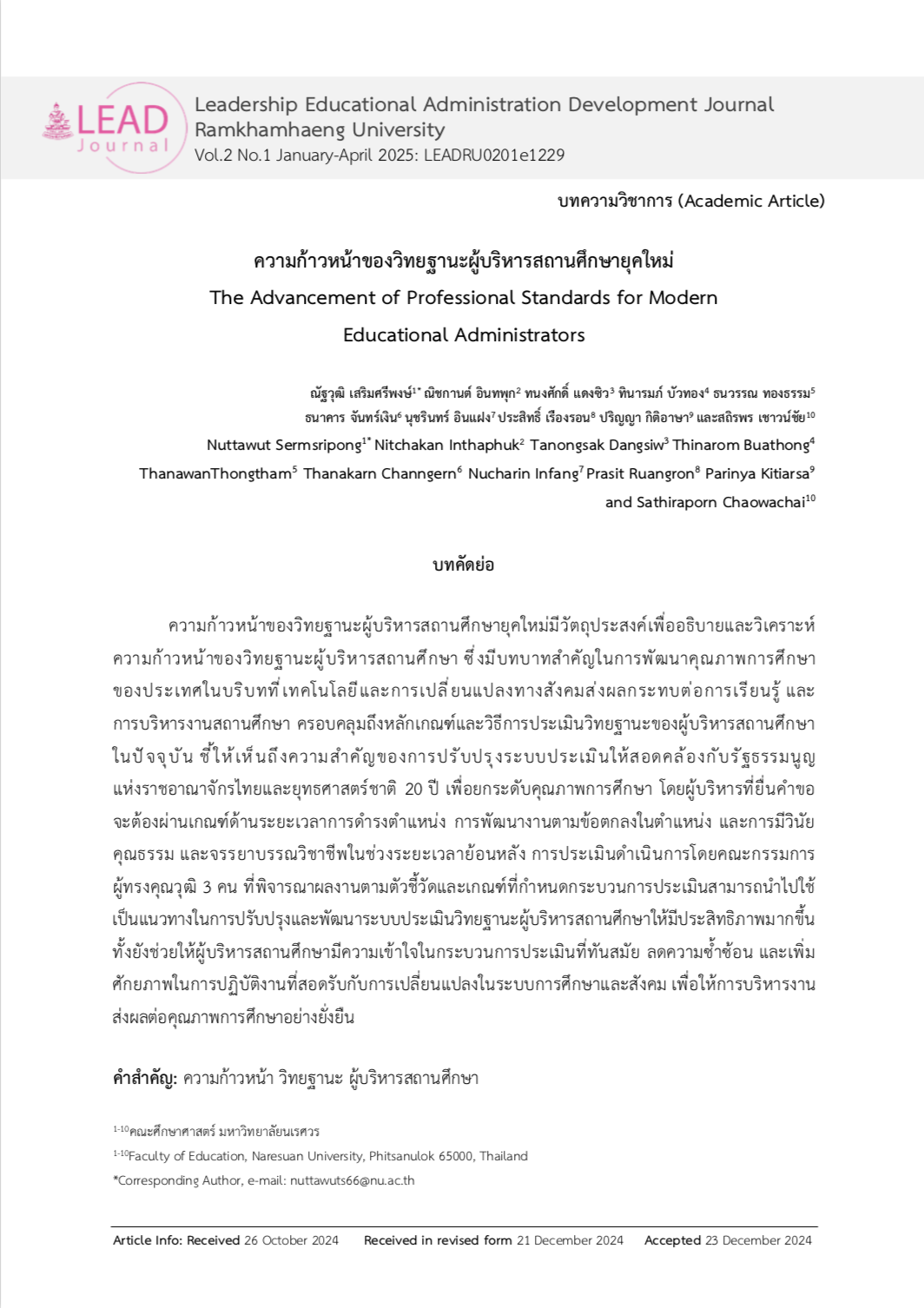ความก้าวหน้าของวิทยฐานะผู้บริหารสถานศึกษายุคใหม่
Main Article Content
บทคัดย่อ
ความก้าวหน้าของวิทยฐานะผู้บริหารสถานศึกษายุคใหม่มีวัตถุประสงค์เพื่ออธิบายและวิเคราะห์ความก้าวหน้าของวิทยฐานะผู้บริหารสถานศึกษา ซึ่งมีบทบาทสำคัญในการพัฒนาคุณภาพการศึกษาของประเทศในบริบทที่เทคโนโลยีและการเปลี่ยนแปลงทางสังคมส่งผลกระทบต่อการเรียนรู้ และการบริหารงานสถานศึกษาครอบคลุมถึงหลักเกณฑ์และวิธีการประเมินวิทยฐานะของผู้บริหารสถานศึกษาในปัจจุบัน ชี้ให้เห็นถึงความสำคัญของการปรับปรุงระบบประเมินให้สอดคล้องกับรัฐธรรมนูญแห่งราชอาณาจักรไทยและยุทธศาสตร์ชาติ 20 ปี เพื่อยกระดับคุณภาพการศึกษา โดยผู้บริหารที่ยื่นคำขอจะต้องผ่านเกณฑ์ด้านระยะเวลาการดำรงตำแหน่ง การพัฒนางานตามข้อตกลงในตำแหน่ง และการมีวินัย คุณธรรม และจรรยาบรรณวิชาชีพในช่วงระยะเวลาย้อนหลัง การประเมินดำเนินการโดยคณะกรรมการผู้ทรงคุณวุฒิ 3 คน ที่พิจารณาผลงานตามตัวชี้วัดและเกณฑ์ที่กำหนดกระบวนการประเมินสามารถนำไปใช้เป็นแนวทางในการปรับปรุงและพัฒนาระบบประเมินวิทยฐานะผู้บริหารสถานศึกษาให้มีประสิทธิภาพมากขึ้น ทั้งยังช่วยให้ผู้บริหารสถานศึกษามีความเข้าใจในกระบวนการประเมินที่ทันสมัย ลดความซ้ำซ้อน และเพิ่มศักยภาพในการปฏิบัติงานที่สอดรับกับการเปลี่ยนแปลงในระบบการศึกษาและสังคม เพื่อให้การบริหารงานส่งผลต่อคุณภาพการศึกษาอย่างยั่งยืน
Downloads
Article Details

อนุญาตภายใต้เงื่อนไข Creative Commons Attribution-NonCommercial-NoDerivatives 4.0 International License.
The authors are solely accountable for the ideas and recommendations articulated in the articles published in The LEAD Journal RU. Should there be any inaccuracies, the authors accept full responsibility for such errors.
Moreover, the Editorial Board, Editorial Team, and Committee of The LEAD Journal RU are committed to maintaining the integrity of the principles reflected in the authors' contributions.
Consequently, Ramkhamhaeng University, the Editorial Board, Editorial Team, and Editors shall not be held liable for any outcomes arising from the authors' presentation of their ideas and recommendations within The LEAD Journal RU.
เอกสารอ้างอิง
Chairipoo, K., Bumbudtuk, N., ... and Nilkote, R. (2022). Teacher Academic Assessment System and Student Outcomes in the Era of Change. Journal of Quality of Life and Law, 18(2), 101-110. [In Thai].
Chaisri, P. (2024). The Role of Educational Administrators in the New Era. (Master of Thesis, Phetchabun Rajabhat University). [In Thai].
Chimpaleesawan, A. (2021). The Condition of Requesting to Have or to Promote Academic Standing Towards the Performance of Teacher Civil Servants in Secondary Education Service Area Office District 42. Journal of Basic Education Research, Inaugural Issue, July–December 2021, 183-194. [In Thai].
Christensen, C. M., Horn, M. B. and Johnson, C. W. (2011). Disrupting class: How disruptive innovation will change the way the world learns. McGraw-Hill.
Department of Curriculum and Instruction. (2020). Standards for the Evaluation and Development of Educational Administrators. Bangkok: Department of Curriculum and Instruction. [In Thai].
Epstein, J. L., Sanders, M. G., … and Jansorn, N. R. (2011). School, Family, and Community Partnerships: Preparing Educators and Improving Schools (2nd ed.). Thousand Oaks, California: Corwin Press.
Fullan, M. (2011). The New Meaning of Educational Change. New York: Teachers College Press.
Ninkaew, J. (2022). The Role of Administrators in Promoting the Use of Innovation and Information Technology for Learning Management of Teachers under Chumphon Primary Education Service Area Office 1. (Master of Thesis, Rajamangala University of Technology). [In Thai].
Prachongsak, S. (2011). A Study on Processes and Steps in Producing Academic Papers to be Ranked as a Specialist Teacher. Journal of Education and Social Development, 7(1), 57-67. [In Thai].
Suntan, K (2020). Managerial Strategies for Education Quality of Small-Scaled Primary Schools According to the Student Focus Concept. (Master of Thesis, Eastern Asia University). [In Thai].
Tilbury, D. (2011). Education for Sustainable Development: An Expert Review of Processes and Learning. UNESCO.
United Nations Educational, Scientific and Cultural Organization. (2015). Rethinking Education: Towards a Global Common Good?. Prance: UNESCO.
Watkins, K. E. and Marsick, V. J. (2017). Facilitating Learning Organizations: Making Learning Count. England: Gower.


